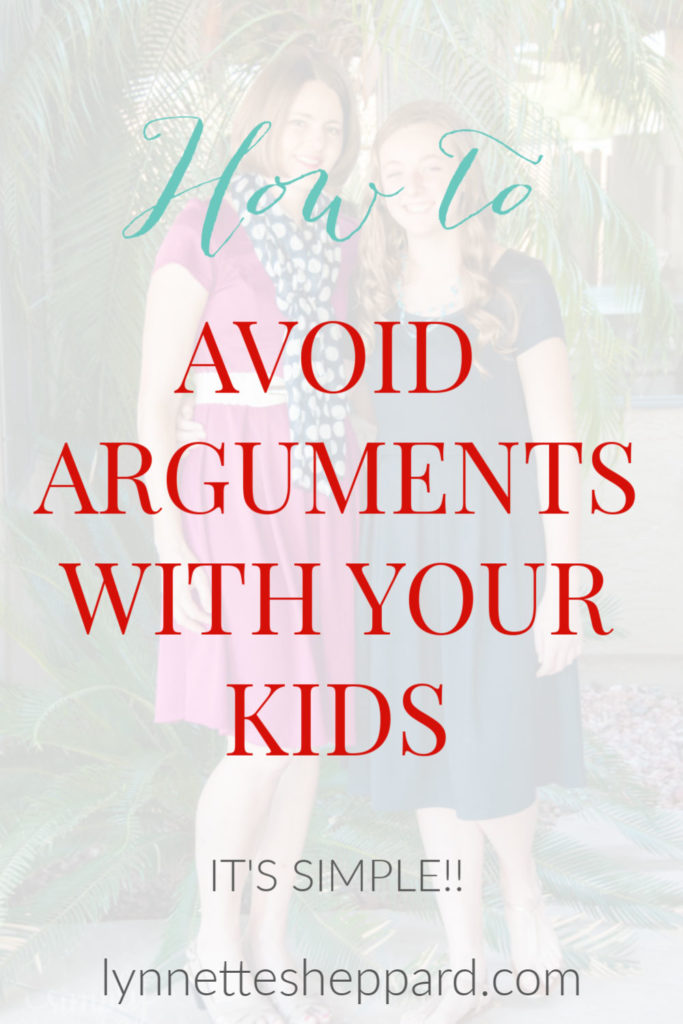
One of the perks of having teenagers is that I have the blessed opportunity to hone my communication skills. In case you didn’t know, teenagers are natural arguers. They crave independence and generally do not appreciate parental restrictions.
Their desire to make their own decisions encourages them to use the word “why” on a frequent basis.
Why can’t I go out with my friends at midnight?
Why can’t I watch YouTube for three hours after school before doing my homework or my chores?
Why can’t I pile into a car with six of my friends when the driver just got his license last week?
Why can’t I take my smartphone or iPad into my bedroom for hours at a time? Don’t you trust me?
Why are you SO STRICT?!? None of my friends’ parents have so many rules!
Since I know you are all dying to know how to respond to such inquiries without getting into an argument with your beloved teens, I am going to share a well-kept, magical secret that might change your life:
When a teenager (or child, for that matter) asks why you won’t allow them to do something, they (generally speaking) have ZERO interest in understanding the reason. They only care about talking you out of your decision, so they can have their way. Any amount of explanation on your part will not help them see things from your perspective. It will only fuel an argument.
If you don’t want to get entangled in the argument trap, stop explaining yourself, and give those darling kids of yours the last word.
I know what you are thinking:
“But Lynnette, my kids will never understand where I am coming from if I do not tell them my reasoning. And why should I give them the last word and let them win?”
I’m so glad you asked.
Like I said before, kids of any age will probably not appreciate or agree with your perspective even if you explain your reasoning. Chances are, they will only understand your position when they are in your shoes and have children of their own, so don’t be afraid to save your breath and skip the explanation.
If you feel inclined to give them a reason anyway, go ahead and do it, as long as you also refuse to engage. I will show you how to do this with a recent example from my life (with a little exaggeration to prove a point, and names changed to protect the not-so-innocent):
Daughter: Mom, can I go to the movies with my friends tonight?
Me: Who is going, and how will you be getting there?
Daughter: Lisa, Madison, and I are meeting at Johnny’s house, and he will drive us to the movies and back.
Me: Johnny just got his driver’s license a few weeks ago. The law requires him to wait six months before driving with more than one passenger outside of his family. I will take you to the movies to meet your friends, but you will not be riding with Johnny.
Daughter: MOM!!! Nobody follows that dumb law. Everybody I know drives more than one passenger as soon as they get their license. I don’t want to be the only one left out! PLEASE let me go with them!
Me: In this family, we follow the “dumb” laws. Like I said, I will take you to the theatre to meet your friends, but you will not be driving with them.
Daughter: WHY DO WE HAVE TO BE THE ONLY ONES WHO FOLLOW THE STUPID LAWS?!? NONE OF MY FRIENDS’ PARENTS CARE ABOUT THAT STUFF, AND THEY ARE ALL GOOD PEOPLE. WHY ARE YOU SO STRICT AND UNFAIR?!? YOU ARE RUINING MY LIFE!
Me: (While walking out of the room) I would probably feel the same way if I were you. Take my offer or leave it, sister. It’s up to you.
In this case, I told my daughter the reason for my decision, but I did not allow her to pull me into an argument. I did not try to defend myself against her silly accusations, knowing that would only make the situation worse. I did not call her out for being disrespectful and ridiculous, or otherwise play along with her emotional outburst. Instead, I left the ball in her court.
By walking out of the room after telling her that I would probably feel the same way if I were in her shoes, the power struggle was over before it began. Of course, she wasn’t happy with my decision or my refusal to play her game. But the situation diffused quickly without a heated argument, so we will call that a win.
Remember, friends; it takes two to argue. If you refuse to show up when your kids invite you to participate in a battle of words, the war will never get off the ground. However hard it may be (and sometimes, it is SO hard), resist the urge to fight.

And one more thing (this is VITAL):
DO NOT TAKE WHATEVER GARBAGE THAT COMES OUT OF YOUR KIDS’ MOUTHS DURING SUCH AN ENCOUNTER PERSONALLY!!!
If they tell you that they hate you, you are a horrible parent, or your feet stink, let it roll right off your back. IT IS ALL TALK. THEY DO NOT MEAN IT! It is a ploy to make you feel guilty enough to give in to their demands.
DO NOT FALL FOR IT!!
You are smart, strong, and resilient, and need not play your kids’ manipulative game for one second. Giving in will only teach them that they can walk all over you to get what they want.
If you are not so sure you can stand your ground under these types of heated circumstances, practice this line repeatedly until you can say it with your head held high:
“I would probably feel the same way if I were you.”
That is all. Leave the room after you say it. Do not look back. Lock yourself in your closet and drown your sorrows in Oreos and chocolate bars.
You can do this. YOU ARE A ROCKSTAR. No child or teenager of yours is going to change that.
To be clear, I am not perfect at avoiding arguments with my teens. Sometimes, my emotions get the best of me, and good intentions go off the rails.
I can, however, tell you without reservation that arguments with passionate teenagers and children will become a rare (if not extinct) occurrence once you learn to let them have the last word, leave the ball in their court, disengage, and walk away. That formula is a piece of communication magic.









This is great! I should have read this last week… but it will help me in the future! Thank you, Lynnette!
I’m glad you liked it!
Lynnette…seriously such great advice. I love that line “ I would probably feel the same way if I were you.” It validates just enough. I went to a class at education week once and the couple there would use the word “nevertheless”. If their child was whinning about a chore or rule, they would simply say nevertheless and walk away. I like your line more especially for teenagers. Nevertheless works with my young children as they cry about making their bed or whatever. Now I just need to get the exit down.
You’re amazing.
I love that…” nevertheless.” Short, sweet, and to the point. Sometimes, fewer words are better. Thank you for sharing!
I LOVED this post! I love how it difuses a situation, before it becomes one, and also it helps me as a parent to also understand how they feel because I was once a youth, and I remember saying things like this! I am going to use this, I think there is a lot of power in the words we choose to use as a parent to our children and this simple statement is powerful. Thank you so much!
Words are so powerful!